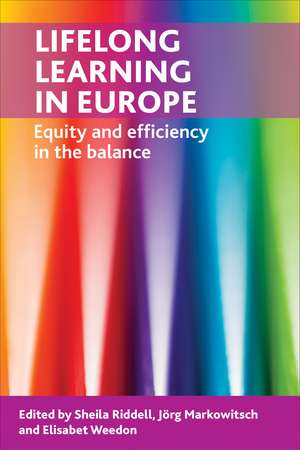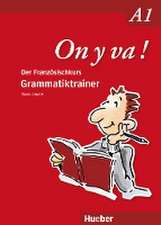Lifelong Learning in Europe: Equity and Efficiency in the Balance
Editat de Sheila Riddell, Jörg Markowitsch, Elisabet Weedonen Limba Engleză Hardback – 3 iul 2012
The ongoing economic crisis in Europe raises fundamental questions about the European Union’s ability to harmonize educational policy across its member states. With evidence that European unity is clearly faltering, many educational goals, including lifelong learning, are in trouble. In this book, the contributors work toward a greater understanding of lifelong learning in an expanded Europe, with particular emphasis on post-Soviet states. Examining data from the EU Sixth Framework Project Lifelong Learning Policy and Practice in Europe, they provide important insights on how lifelong learning contributes to economic growth and social cohesion, as well as how it has evolved over the years.
Preț: 829.71 lei
Preț vechi: 1077.55 lei
-23% Nou
Puncte Express: 1245
Preț estimativ în valută:
158.78€ • 172.42$ • 133.38£
158.78€ • 172.42$ • 133.38£
Carte tipărită la comandă
Livrare economică 22 aprilie-06 mai
Preluare comenzi: 021 569.72.76
Specificații
ISBN-13: 9781447300137
ISBN-10: 1447300130
Pagini: 182
Dimensiuni: 171 x 241 x 30 mm
Greutate: 0.5 kg
Editura: Bristol University Press
Colecția Policy Press
ISBN-10: 1447300130
Pagini: 182
Dimensiuni: 171 x 241 x 30 mm
Greutate: 0.5 kg
Editura: Bristol University Press
Colecția Policy Press
Notă biografică
Sheila Riddell is founding director of the Centre for Research in Education, Inclusion and Diversity at the University of Edinburgh, where Elisabet Weedon is senior research fellow. Together they are coauthors, with additional scholars, of Patterns of Lifelong Learning. Jörg Markowitsch is founder and senior partner of 3s Unternehmensberatung GmbH.
Cuprins
List of figures, tables and case studies
Notes on contributors
List of contributors, by country, to the EU Sixth Framework Project 'Towards a Lifelong Learning Society in Europe: The Contribution of the Education System' (LLL2010)
1. Lifelong learning and the generation of human and social capital
2. Lifelong learning and the wider European socioeconomic context
3. Neoliberal and inclusive themes in European lifelong learning policy
4. Formal adult education in the spotlight: profiles, motivations and experiences of participants in 12 European countries
5. The sociodemographic obstacles to participating in lifelong learning across Europe
6.The qualification-providing enterprise? Support of formal adult education in small and medium-sized enterprises
7. Reducing or reinforcing inequality: assessing the impact of European policy in widening access to higher education
8. Conclusion: the role of lifelong learning in reducing social inequality at a time of economic crisis
Technical annex to Chapter Four
Glossary of terms and abbreviations
Index
Notes on contributors
List of contributors, by country, to the EU Sixth Framework Project 'Towards a Lifelong Learning Society in Europe: The Contribution of the Education System' (LLL2010)
1. Lifelong learning and the generation of human and social capital
2. Lifelong learning and the wider European socioeconomic context
3. Neoliberal and inclusive themes in European lifelong learning policy
4. Formal adult education in the spotlight: profiles, motivations and experiences of participants in 12 European countries
5. The sociodemographic obstacles to participating in lifelong learning across Europe
6.The qualification-providing enterprise? Support of formal adult education in small and medium-sized enterprises
7. Reducing or reinforcing inequality: assessing the impact of European policy in widening access to higher education
8. Conclusion: the role of lifelong learning in reducing social inequality at a time of economic crisis
Technical annex to Chapter Four
Glossary of terms and abbreviations
Index
Recenzii
“This important study draws on rigorous international research, reviews key theoretical and policy debates, and presents new insights into the different meanings and practices of lifelong learning in Europe. It will appeal broadly to social scientists and to policy makers and managers in the field.”


